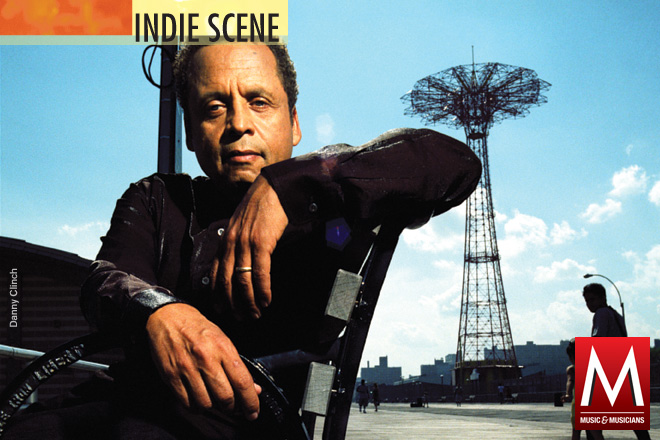GARLAND JEFFREYS
After an inspirational break to raise his daughter, it’s time to get wild again
Garland Jeffreys is a New York City man through and through. Born in Brooklyn, he first made his name on the city’s thriving folk scene in the mid-1960s. He fell in with fellow Syracuse University student Lou Reed, and before long found himself in the studio playing guitar on Vintage Violence, the 1969 debut solo album by Reed’s Velvet Underground bandmate John Cale (and contributing a song, “Fairweather Friend”). After making an album with his Woodstock-based band Grinder’s Switch, he kicked off a solo career that found him returning often to the Big Apple for inspiration.
Now 67, Jeffreys is still seeing the world through a New Yorker’s lens on his latest, The King of In Between. “Everybody needs a handle, and I think that’s definitely been the case with my songs to a degree,” he says. “But it’s not as simple as that. New York is only a metaphor—the content reverberates way beyond New York. It’s about what’s going on in this country, people suffering, the difficulty of making a living.”
Jeffreys has seen his share of struggles. Stardom seemed imminent when his self-titled 1973 album earned critical buzz and a contemporaneous single, “Wild in the Streets,” became a radio hit. But as the ’70s turned into the ’80s and he was shuffled from one major label to another, the expected commercial breakthrough never materialized. “There have been disappointments,” he concedes. “Record companies aren’t concerned with what’s thoughtful or artful. They don’t think in terms of quality.”
Frustrated with his lack of traction, Jeffreys didn’t release new music for nearly nine years. Upon his 1992 return with Don’t Call Me Buckwheat, he discovered that “Wild in the Streets” had become something of an anthem for the burgeoning skateboarding community. After a few years of increased visibility, he disappeared yet again—this time for a very different reason. “It had to do with my daughter being born,” Jeffreys says. “I never had a child before, and wanted to be around for her. I learned how to be a parent. If I didn’t stay home for that period of time, it wouldn’t necessarily be disastrous, but it wouldn’t be what I would expect to give to my kid. I was there, and she benefited from it.”
Now teenage Savannah Jeffreys is writing and singing songs of her own, and her father is back in business. “It’s been centuries,” he jokes. “But making this new album was just a heavenly experience.” Most of The King of In Between was recorded live, complete with the vocals, with only minimal overdubs added. In addition to his beloved New York City and other subjects, the album finds Jeffreys pondering a topic fairly new to his songwriting: mortality. “It’s not that I was suddenly looking for it,” he says. “It’s simply a fact. If I was still 50 I probably wouldn’t be that focused on it.”
Given his prior experiences with record labels, it should come as no surprise that Jeffreys has chosen to release his newest effort independently. “I’m making decisions now without interference,” he says. “There was no screening for the record company. We’re putting the creativity out directly.”
–Lee Zimmerman




comment closed